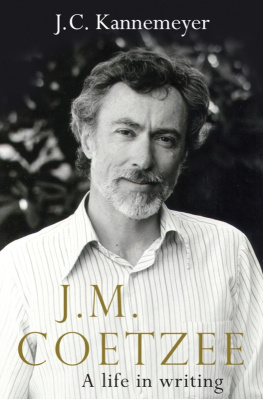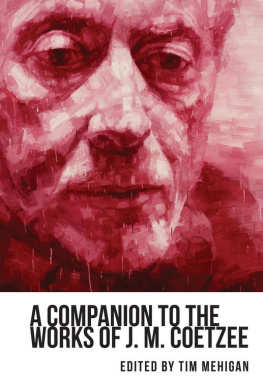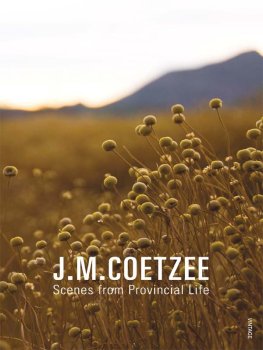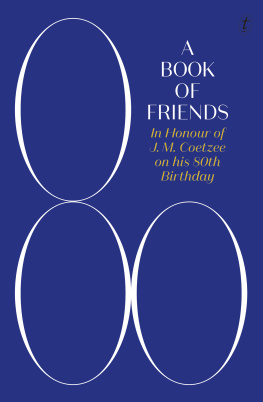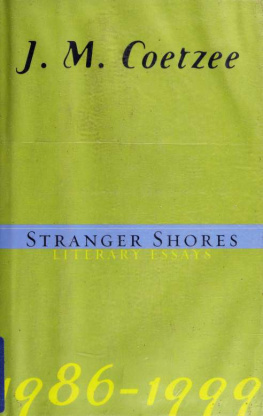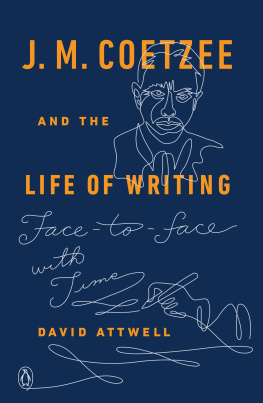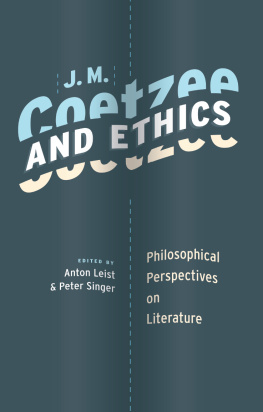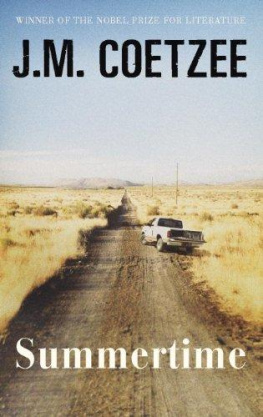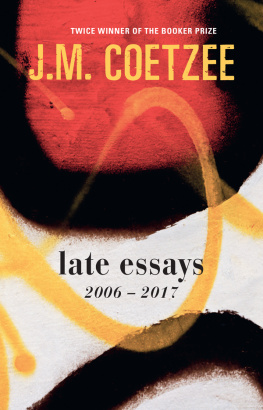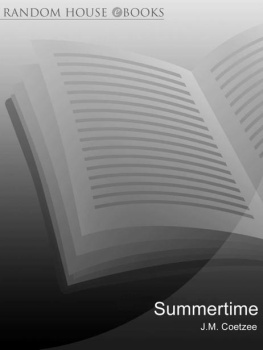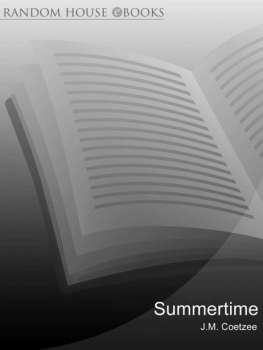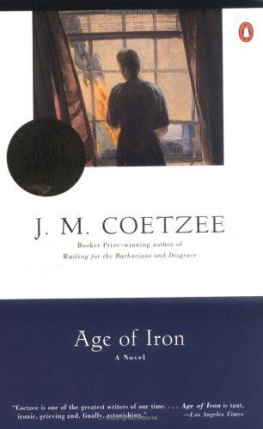
SCRIBE PUBLICATIONS
J.M. Coetzee
J.C. Kannemeyer was professor of Afrikaans and Dutch at Stellenbosch University. In 1962 he joined the University of Cape Town as lecturer in Afrikaans and Dutch; later, he lectured at the Randse Afrikaanse Universiteit and Stellenbosch University, and was professor in Afrikaans and Dutch at the University of the Witwatersrand from 19821987. In 1992, Professor Kannemeyer returned to Stellenbosch as an independent researcher. He was the author of a two-volume history of Afrikaans literature, as well as of six extensive biographies of Afrikaans authors. Professor Kannemeyer died on 25 December 2011.
For Santa
Scribe Publications Pty Ltd
1820 Edward St, Brunswick, Victoria 3056, Australia
50A Kingsway Place, Sans Walk, London, EC1R 0LU, United Kingdom
Published in Australia and New Zealand by Scribe 2012
Published in the United Kingdom by Scribe 2013
This edition published by arrangement with Uitgeverij Cossee, Amsterdam
Text copyright J.C. and A.C. Kannemeyer 2012
English translation Michiel Heyns 2012
Citations from published and unpublished work J.M. Coetzee 2012
All rights reserved. Without limiting the rights under copyright reserved above, no part of this publication may be reproduced, stored in or introduced into a retrieval system, or transmitted, in any form or by any means (electronic, mechanical, photocopying, recording or otherwise) without the prior written permission of the publishers of this book.
The moral right of the Author has been asserted.
National Library of Australia Cataloguing-in-Publication entry
Kannemeyer, John Christoffel.
J.M. Coetzee : a life in writing / J.C. Kannemeyer.
9781921942976 (e-book.)
1. Coetzee, J.M., 1940- 2. Authors, South African--20th century--Biography. 3 Authors, Australian--20th century--Biography. 4. Fiction--Male authors--Biography.
A823.3
scribepublications.com.au
scribepublications.co.uk
CONTENTS
I
ORIGINS , EARLY YEARS AND FIRST WRITINGS (19401961)
.
.
.
.
II
BRITISH INTERLUDE (19621965)
.
III
THE UNITED STATES OF AMERICA (19651971)
.
.
IV
SOUTH AFRICA (19712001)
.
.
.
.
.
.
V
AUSTRALIA (2002)
.
.
.
.
PREFACE
I
The research for this biography of J.M. Coetzee began in July 2008 with a rereading of his published work and a preliminary investigation of the secondary literature. I was fully aware that I was dealing with a renowned author, a central figure in English studies at universities worldwide. About M.A. and doctoral dissertations on his work have been completed while new books on his novels are appearing all the time in various languages. In September 2008 I worked my way through some of this abundance of studies on Coetzee in the National English Literary Museum (NELM) in Grahamstown. In March 2009 I visited Coetzee in Adelaide, Australia, where I interviewed him extensively for two weeks. With the help of an assistant, I acquired copies of the vast collection of documents to which he had granted me access, and explored those of his manuscripts still in his keeping. For further information I was able to contact people with whom Coetzee had put me in touch. I started writing the manuscript on January 2010 . While writing, I continued researching, and in April 2010 I visited the Houghton Library at Harvard, where most of Coetzees manuscripts were then lodged. The final draft of the manuscript was completed in September 2011 .
When I arrived in Adelaide in March 2009 to interview Coetzee, he told me that his major concern was that the biography should be factually correct. He would in no way interfere with my interpretation of the data.
From the outset Coetzee cooperated unstintingly and even enthu-siastically. He answered all my questions succinctly and pertinently, but did not want to be drawn into speculations and opinions, especially not on interpretations of his work. Even when I asked him which critics he felt had most nearly approached saying something fundamental about his work, he adroitly redirected the question, avoiding a reply. Questions on sensitive topics such as the estrangement and divorce from his wife, Philippa Jubber; the death of their son, Nicolas; and the illness of his daughter, Gisela he answered in detail, succinctly, directly, and as objectively as possible, however unsettling the facts.
II
The significance of biographical information in dealing with a writer like J.M. Coetzee is a moot point. In her 1990 introduction to a bibliography of his writings, Teresa Dovey, the author of The Novels of J.M. Coetzee , states that in dealing with somebody like Coetzee personal biography is of lesser importance. This statement is approvingly quoted by David Attwell, a prominent expert on Coetzees work, in J.M. Coetzee: South Africa and the Politics of Writing ( 1993 ).
Dovey and Attwell made these pronouncements before the publi-cation of the triptych of autobiographical works initiated by Boyhood ( 1997 ) and followed by Youth ( 2002 ) and Summertime ( 2009 ). But even before publication of this trilogy, researchers might have discerned autobiographical moments in Coetzees work. In his very first novel, Dusklands ( 1974 ), for instance, he makes play with his ancestors and with his own history. Eugene Dawn, in The Vietnam Project, reports to a man named Coetzee; and in The Narrative of Jacobus Coetzee, the translator, J.M. Coetzee, adds an afterword by his father to the original narrative of his eighteenth-century forbear. If they had known, also, how the Coetzee family farm, Volfontein, sporadically formed the background to the authors second novel, In the Heart of the Country ( 1976 ), they could have found autobiographical traces there as well.
Up to the publication of Boyhood the autobiographical element in Coetzees fiction was under-appreciated, but by 2005 , with the first two parts of the trilogy published, Derek Attridge could say about the autobiographical context of Coetzees writings: Coetzees biographers, when they draw their connections between the life and the fiction, will have a mass of material to work with: even with the small amount of biographical information that is currently in the public domain it is clear that the novels are woven out of personal experiences and obsessions.
Coetzee himself on more than one occasion commented on auto-biography as a genre, and chose it as the subject of his inaugural professorial address at the University of Cape Town. According to him, all the writings of an author, including his literary criticism, are autobiographical, since he often comments on traditions with which he aligns himself or from which he consciously diverges, and on writers who have influenced him or whose work speaks to him with particular urgency. When a writer commits himself to recording his own life, he selects from a whole reservoir of memories. Autobiography, as Coetzee puts it in one of his interviews with David Attwell, is a kind of self-writing in which you are constrained to respect the facts of your history. But which facts?All the facts? No. All the facts are too many facts. You choose the facts insofar as they fall in with your evolving purpose.
For Coetzee, then, the question of selection is crucial in auto-biographical writing. Even when he is being absolutely faithful to the facts, the author makes a selection from the many facts at his disposal, so that the relation between a true biography and a fictional biography is by no means as clear-cut as one might think. Thats why Coetzee tells Attwell: All autobiography is storytelling, all writing is autobiography. It is not the aim of the artist to reproduce reality faithfully, but to use and process reality. Through ordering and selecting, the artist arrives at a more complete truth than the historian, who is bound by facts. An autobiography is, in truth, as Martin van Amerongen says, not a verifiable curriculum vitae, but an interpretation, sometimes even a complete, self-sufficient work of art with its own laws and criteria. Indeed, James Olney claims that the autobiographer half discovers, half creates a deeper design and truth than adherence to historical and factual truth could ever make claim to.
Next page
